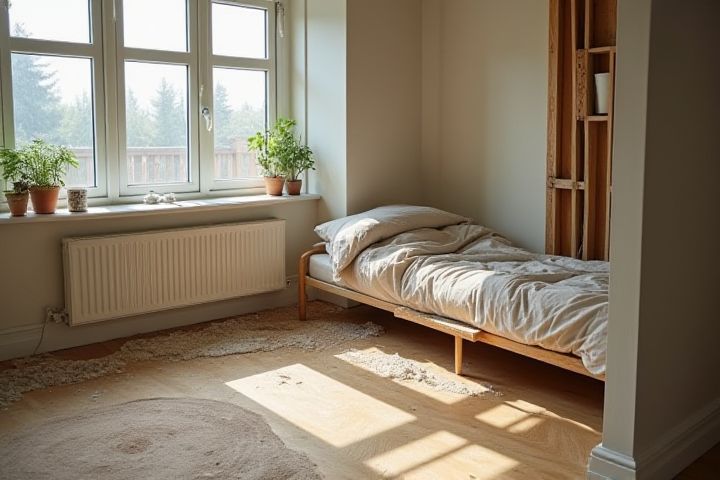
Living in a house during renovation is entirely possible, but it comes with specific considerations. You should assess the scale of the renovation; minor updates may allow for comfortable living, while extensive projects could lead to significant disruptions. Safety is paramount, particularly if there are exposed electrical wires or potential hazards; ensuring these are managed properly protects you and your family. During the renovation, designate a clean, safe space within the home to relax, ideally away from the construction areas. Finally, effective communication with your contractors about timelines and expectations can help mitigate stress and facilitate a smoother process during your home transformation.
Can We Live In House During Renovation
Safety precautions
Living in a house during renovation poses significant safety risks that require careful planning and precautions. First, ensure that all hazardous materials, such as asbestos or lead paint, are identified and safely managed by professionals. Establish a designated living area away from heavy construction zones to minimize exposure to dust and debris, and utilize appropriate personal protective equipment (PPE) if necessary. Finally, maintain clear communication with contractors about the renovation schedule and safety practices to ensure a safe environment for you and your family.
Dust and noise levels
Living in a house during renovation can present challenges related to dust and noise levels. Dust generated from construction activities can affect air quality, making it essential to implement dust control measures such as sealing off areas and using air purifiers. Noise from tools and machinery may disrupt your daily routine, so establishing designated quiet times or using soundproofing materials can help mitigate disturbances. You might consider staying in a separate area of the house during the most intense phases of renovation to minimize exposure to both dust and noise.
Functional utilities
Living in a house during renovations can be feasible if essential functional utilities are maintained. Ensure that you have access to running water, electricity, and heating to support daily activities. Create a designated living space that is separate from the renovation zone to minimize disruption, ideally with at least one working bathroom and a kitchen area for cooking and cleaning. By carefully planning and communicating with your contractors, you can maintain a degree of comfort while experiencing necessary upgrades to your home.
Access to essential areas
Yes, you can live in your house during renovations by prioritizing access to essential areas such as the kitchen, bathroom, and sleeping spaces. Creating a temporary kitchenette with essential appliances and supplies can facilitate meal preparation without hindering the project. Designate a bathroom that is unaffected by the renovation, ensuring you maintain privacy and convenience for personal hygiene. By effectively organizing your living space, you can minimize disruption and make your home manageable during the renovation process.
Presence of children and pets
Living in a house during renovations can be challenging, especially with children and pets present. It's essential to ensure safety by designating specific areas as off-limits and removing hazards such as sharp tools or materials. You should maintain a clean and organized environment to minimize stress and provide a comfortable space for your family. Consider involving children in the process to make them feel included, while also setting boundaries for pets to prevent accidents or exposure to hazardous substances.
Temporary kitchen setup
Creating a temporary kitchen during a home renovation is essential for maintaining daily routines. You can designate a small area in your home, such as a corner of a living room or a garage, to set up essential appliances like a microwave, toaster oven, and a mini-fridge. Ensure you have easy access to water for cooking and dishwashing by using a nearby bathroom or laundry sink, which can serve as an alternate source. To simplify meal prep, consider using disposable plates and utensils, allowing you to keep your temporary kitchen functional without overwhelming clean-up.
Air quality concerns
Living in a house during renovations can pose significant air quality concerns. Dust, VOCs (volatile organic compounds), and other particulates can become airborne, potentially affecting respiratory health. To mitigate these risks, ensure proper ventilation by opening windows or using air purifiers equipped with HEPA filters. Consider scheduling high-dust activities when you can temporarily vacate the home, minimizing your exposure to harmful elements.
Contractor coordination
Living in a house during renovation requires effective contractor coordination to minimize disruptions. It's essential to establish clear communication channels with your contractor--designating specific hours for noisy activities and ensuring that essential utilities remain functional is crucial. For larger renovations, consider a phased approach, allowing you to occupy areas of your home while the contractor works on other spaces. Be proactive in scheduling regular check-ins to address any concerns and ensure that the project stays on track and meets your expectations.
Permit regulations
Living in a house during renovations is subject to specific permit regulations, which vary by location. Local building codes may dictate whether you can occupy a property during construction and what types of improvements require permits, such as significant structural changes or extensive electrical work. If renovations affect essential utilities like water or electricity, obtaining a special occupancy permit may be necessary to ensure safety and compliance. Always consult your local building authority to understand the regulations that apply to your situation and to avoid potential fines or legal issues.
Project timeline
Living in your house during renovations can be feasible if you plan your project timeline carefully. Typically, for smaller remodels, such as kitchen upgrades or bathroom renovations, you might allocate 4 to 6 weeks, allowing you to stay put with minimal disruption. However, for extensive projects, like entire home renovations, the timeline could extend from 3 to 6 months, requiring strategic relocation or the use of temporary living arrangements. Be prepared to adjust your living space expectations, as certain areas may be off-limits while work is completed, impacting your daily routines.
